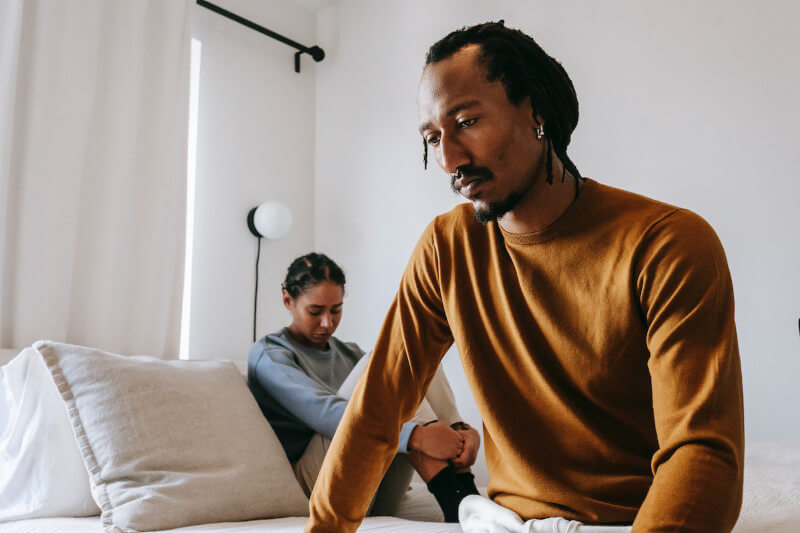It’s difficult to watch a loved one fight depression from the sidelines. You may be feeling lost, discouraged, and overpowered. Each time you try to “help” your partner, they may reject or dismiss you. You could start to blame yourself for your partner’s mood disorder. There are others in your position. As an isolated mental disorder, depression can strain relationships and instil feelings of helplessness and fear in those closest to the depressed person.
Major depressive disorder is characterised by an overwhelming sense of sadness, hopelessness, discouragement, or low spirits, as well as persistent anger. Constant anger and shifting blame to others are typical. People who are depressed often retreat from society and lose interest in previously pleasurable activities. Depression makes a person seem disinterested in the things that used to bring them happiness, and this is something loved ones often observe. Due to these various reasons, it may be challenging to know how to aid a spouse who is depressed. However, your backing is essential. Although you may not be able to “cure” your partner’s sadness, you can aid them in their journey to wellness.
Challenges

Having a loved one with an anxiety condition is challenging for the person who suffers from the disorder, but it may also be challenging for the person’s friends and family. If one of you is experiencing anxiety issues, your partner may be forced to take on more than their fair share of the household, financial, and parenting duties.
Substance Addiction
Helping a loved one through addiction treatment can be a profound experience that requires deep understanding, patience, and emotional strength. It is important to learn that addiction is a disease and not a moral flaw or a lack of willpower. Knowing that addiction is a complicated, long-term disease of the brain can help you understand the struggles your loved one is going through and help you separate the person from the disease. Even as they make progress in treatment, it’s important to remember that recovery is not a straight line; there will be setbacks as well as successes. As their supporter, it’s important to love them no matter what, cheer on their efforts, and have reasonable expectations, all while giving them a stable, drug-free place to live. Respecting their privacy and keeping their recovery process a secret is also very important.
But while caring for a loved one, it’s also important for the caretaker to take care of himself or herself. It’s easy to get caught up in the chaos of someone else’s recovery and forget about your own health. Go to support groups for families of addicts, think about going to therapy, and make sure you have time for things you enjoy and that make you feel good. By doing this, you’ll be better able to give your loved one the kind of support they need. Don’t point fingers, feel guilty, or do things that make things worse. Instead, create an environment of open communication and mutual respect. Remember that you can’t change how well a loved one gets better, but you can change how you react to it. By being there for them, you give them a great deal of support and motivation.
Family Outings
Anxiety sufferers may require alterations to regular family routines and the creation of unique plans or accommodations. It is common for one spouse to be responsible for household chores like grocery shopping, bill paying, and transporting kids to and from extracurricular activities. It’s common for partners to feel exhausted and overburdened. The Official Anxiety Blog has a lot of hany resources on dealing with anxiety in the family.
Money and Work
Some people with anxiety disorders have trouble finding or keeping a job, which can have substantial financial consequences. Sometimes one partner has to shoulder the responsibility of being the sole breadwinner, which can be a significant burden and an undesirable situation for the other. Frequent avoidance of social situations is a common symptom of anxiety disorders. The couple may feel more alone because of the partner’s diminished social life.
Physical Health
Either one or both spouses may experience negative emotions such as sadness, depression, or fear, as well as negative emotions such as anger, resentment, and bitterness toward their relationship. They could even feel bad about their emotions.
Sometimes It’s Hard to Face Up to These Difficulties
People who suffer from anxiety disorders can recover and go on to have fulfilling lives despite their condition. This includes achieving professional and social success and maintaining a full social calendar. When given the right care, many of the factors that add to the stress of a significant other can be resolved.
Optional Actions

Find out what the warning signs are Anxiety disorders share a common symptom set characterised by overthinking and apprehension but manifest in a variety of ways. Emotional symptoms are sometimes accompanied by physical ones, such as the inability to sleep, stomach problems, and muscle and brain aches.
Perhaps Your Spouse Suffers a Panic Attack When Behind the Wheel
They are nervous about driving alone at first. However, after a second attack, they become terrified of being in a car and give up driving altogether. Maybe they have a generalised anxiety disorder, or maybe they just have trouble with small talk. Because of their social anxiety, they have a hard time approaching their coworkers for assistance when they need it. A person’s ability to sleep and eat normally, as well as their motivation to leave the house, might be negatively impacted by a persistent preoccupation with the possibility of receiving negative evaluations from others.
Acknowledge the Significance of Their Story
In the treatment of many psychological diseases, the role of validation is pivotal. By showing that you understand and support your spouse through their anxiety, you can help them overcome it. Communicating compassion and comprehension rather than judgment is key to emotionally validating someone else’s experience. There’s no requirement that you concur with their analysis, but you should at least try to relate to them.
It’s Important to Be Aware of the Warning Indications That Your Partner is Experiencing Anxiety
Different types of anxiety disorders can produce varying degrees of distress in a variety of situations. A person with social anxiety disorder, for instance, may be aroused by even one-on-one social encounters, while someone with agoraphobia may be disturbed by crowds. It is crucial to learn to recognise the signs of anxiety in your spouse, regardless of the specific type of anxiety illness they suffer from. Anxiety can feel like any of the following for many people.
- An anxious, tense, or restless feeling
- Feelings of terror or imminent danger
- Sweating
- Tiredness or weakness
- Rapid beating of the heart
- Hyperventilating
- Trouble falling asleep
- Constant, unmanageable anxiety Distraction
- Discomfort or illness in the belly
- To cut down on exposure to anxiety-inducing stimuli
Anxiety is a normal human emotion, and it occurs very frequently. However, if your significant other exhibits multiple symptoms of anxiety consistently, they may benefit from seeing a mental health expert to evaluate if they are struggling with an anxiety condition.
Participate in Counselling
It’s natural to feel disappointed, angry, and disturbed if someone you care for is depressed. However, you mustn’t give these emotions a chance to develop and flourish. Professional help from therapists, counsellors, and support groups is available for more than just those struggling with depression. You can feel more supported, release pent-up tensions, and become more self-aware by seeking expert help. Questions concerning how to help a loved one who is depressed can also be answered through therapy. It’s crucial to draw on your support system even if you choose not to seek help from a mental health expert.
Raise Their Spirits to Combat Their Despair
What exactly drives their enthusiasm? What time do they start acting excited? The “lows” of depression can be mitigated by facilitating the experience of these emotions.
Techniques
Find moments that work for the two of you to engage in grounding activities like meditation, deep breathing, or yoga.
Fighting Compassion Fatigue is the Final, Crucial Phase
It’s normal to feel exhausted occasionally. Know the warning signals and take care of yourself. Just do it! In a couple, each partner is an independent entity. Just thought you think it’s best, that’s no reason to give up on your passions. Just remember to take care of yourself while also making time to be a support to your partner. According to Changes Rehab in Johannesburg, “Remember that your partner’s mental health issues are not your fault and you cannot “fix” them. Your partner just wants reassurance that you are walking the journey with them.”







